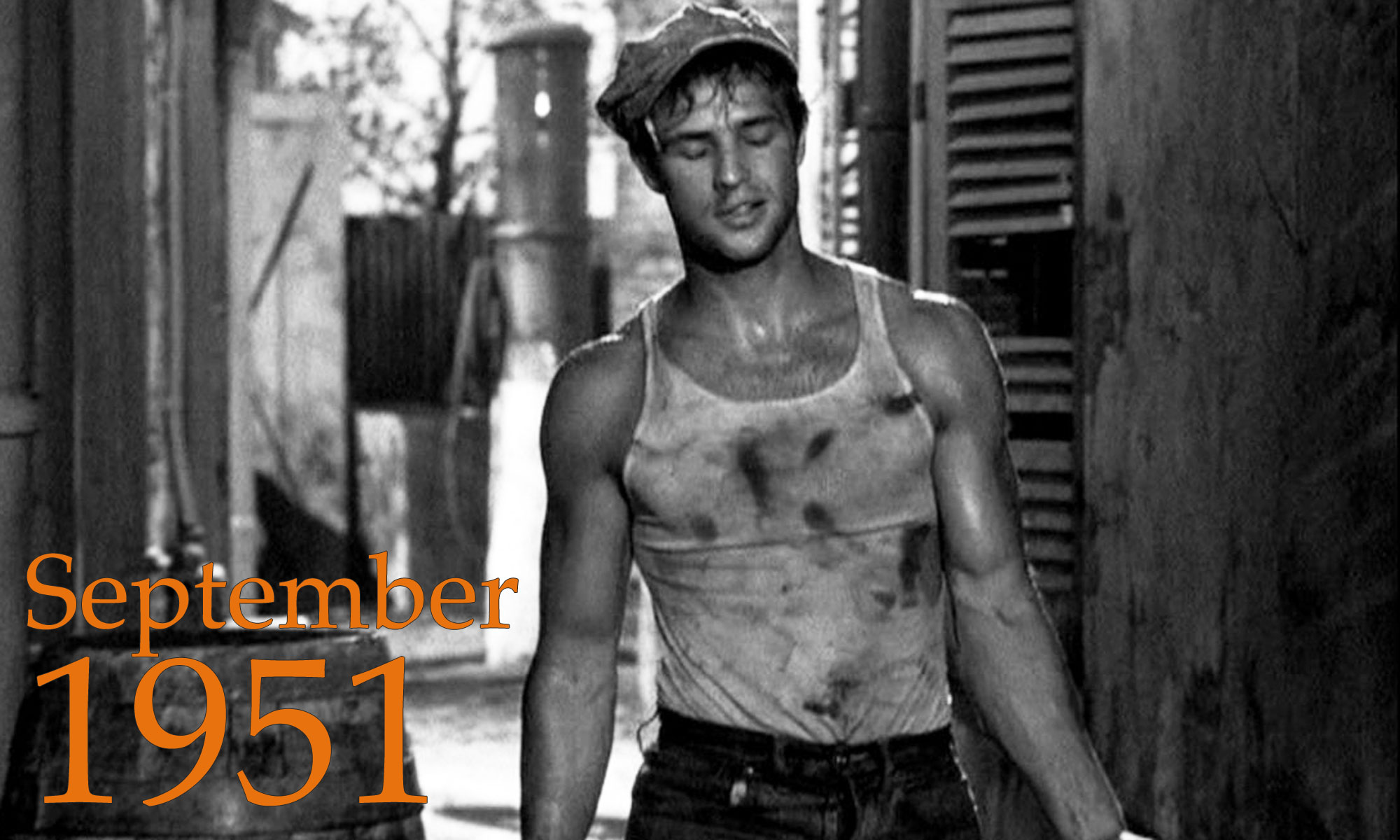| ◄ SEPTEMBER ► | ||||||
|---|---|---|---|---|---|---|
| ◄ 1951 ► | ||||||
| 1 | ||||||
| 2 | 3 | 4 | 5 | 6 | 7 | 8 |
| 9 | 10 | 11 | 12 | 13 | 14 | 15 |
| 16 | 17 | 18 | 19 | 20 | 21 | 22 |
| 23 | 24 | 25 | 26 | 27 | 28 | 29 |
| 30 | ||||||
| President: | Harry S Truman (D) | |||
| Vice-President: | Alben W. Barkley (D) | |||
| House: | 233 (D) | 197 (R) | 1 (Other) | 4 (Vacant) |
| Southern states: | 102 (D) | 2 (R) | 1 (Vacant) | |
| Senate: | 50 (D) | 46 (R) | ||
| Southern states: | 22 (D) | |||
| GDP growth: | 7.3% | (Annual) | ||
| 2.1% | (Quarterly) | |||
| Inflation: | 7.0% | |||
| Unemployment: | 3.3% | |||
| US killed in action, | 1,513 | (This month) | ||
| Korean conflict: | 24,522 | (Since Jun 28, 1950) | ||
![]()
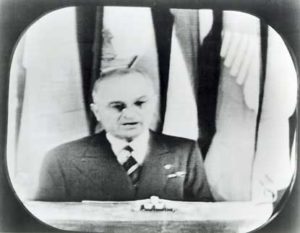 Sep 4: A national television link from the West Coast to the East is accomplished for the first time when President Harry Truman addresses the Japanese Peace Treaty Conference in San Francisco. His speech is carried live to viewers across the continent via a brand new network of relay towers connecting the West Coast to Omaha, Nebraska, formerly the western terminus of network television. Ninety-four of the country’s 107 TV stations carry the President’s address. Only thirteen stations, mostly in the South and Southwest, remain unconnected to the new network. They will carry the speech on a film-delay basis.
Sep 4: A national television link from the West Coast to the East is accomplished for the first time when President Harry Truman addresses the Japanese Peace Treaty Conference in San Francisco. His speech is carried live to viewers across the continent via a brand new network of relay towers connecting the West Coast to Omaha, Nebraska, formerly the western terminus of network television. Ninety-four of the country’s 107 TV stations carry the President’s address. Only thirteen stations, mostly in the South and Southwest, remain unconnected to the new network. They will carry the speech on a film-delay basis.
![]() Sep 4: The Iranian pro-government newspaper Kayhan criticizes Prime Minister Mohammed Mossadegh’s handling of the Anglo-Iranian Oil Company’s bungled nationalization. Kayhan’s editorial notes that, despite AIOC’s alleged misdeeds, it had provided one-third of the country’s national budget and two-thirds of Iran’s foreign exchange. It warns that Iran’s economic collapse could make the country vulnerable to communism. The editorial cites a proverb, likening Mossadegh to a warrior who is asked why he has gone to battle with a bow but no arrows. The warrior responds that the enemy supply the arrows. Officials report that the National Iranian Oil Company, AIOC’s nationalized counterpart, is in complete disarray, with high absenteeism, rampant theft, acts of vandalism, and neglect.
Sep 4: The Iranian pro-government newspaper Kayhan criticizes Prime Minister Mohammed Mossadegh’s handling of the Anglo-Iranian Oil Company’s bungled nationalization. Kayhan’s editorial notes that, despite AIOC’s alleged misdeeds, it had provided one-third of the country’s national budget and two-thirds of Iran’s foreign exchange. It warns that Iran’s economic collapse could make the country vulnerable to communism. The editorial cites a proverb, likening Mossadegh to a warrior who is asked why he has gone to battle with a bow but no arrows. The warrior responds that the enemy supply the arrows. Officials report that the National Iranian Oil Company, AIOC’s nationalized counterpart, is in complete disarray, with high absenteeism, rampant theft, acts of vandalism, and neglect.
![]() Sep 5: Iranian Prime Minister Mohammed Mossadegh counters a nascent challenge to his rule with a lengthy speech in the Senate. Mossadegh announces that he will expel the remaining British engineers and technicians from Abadan if London does not return to the negotiating table within the next two weeks. Mossadegh again obtains a unanimous vote of confidence from the Senate, although less than half the Senate casts a vote due to absences and abstentions. Mossadegh will have a much more difficult time with the Majlis, parliament’s lower house. Meanwhile in London, the Anglo-Iranian Oil company announces that it will sue anyone who buys oil from the Iranian government. AIOC contends that Iran is acting illegally, in violation of the 1933 concession to AIOC, if it sells oil extracted and refined at AIOC facilities. “The company is confident that no oil company of repute or any tanker owners or any brokers of standing will countenance any direct or indirect participation of the unlawful actions of the Iranian government.” This places an effective world-wide embargo on Iran’s oil. Britain’s foreign office announces that, due to Mossadegh’s threat, it now considers negotiations “no longer in suspense but broken off.” Britain also sends four more destroyers to the Persian Gulf to stand by and protect British personnel in Iran in case of an emergency.
Sep 5: Iranian Prime Minister Mohammed Mossadegh counters a nascent challenge to his rule with a lengthy speech in the Senate. Mossadegh announces that he will expel the remaining British engineers and technicians from Abadan if London does not return to the negotiating table within the next two weeks. Mossadegh again obtains a unanimous vote of confidence from the Senate, although less than half the Senate casts a vote due to absences and abstentions. Mossadegh will have a much more difficult time with the Majlis, parliament’s lower house. Meanwhile in London, the Anglo-Iranian Oil company announces that it will sue anyone who buys oil from the Iranian government. AIOC contends that Iran is acting illegally, in violation of the 1933 concession to AIOC, if it sells oil extracted and refined at AIOC facilities. “The company is confident that no oil company of repute or any tanker owners or any brokers of standing will countenance any direct or indirect participation of the unlawful actions of the Iranian government.” This places an effective world-wide embargo on Iran’s oil. Britain’s foreign office announces that, due to Mossadegh’s threat, it now considers negotiations “no longer in suspense but broken off.” Britain also sends four more destroyers to the Persian Gulf to stand by and protect British personnel in Iran in case of an emergency.
![]()
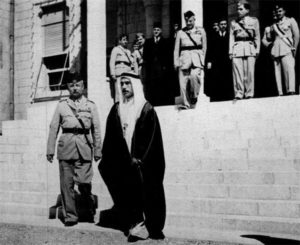 Sep 5: Talal bin Abdullah, the son of assassinated King Abdullah of Jordan, returns to Amman from Switzerland. He became king when his father, King Abdullah, was assassinated in July, but Talal was undergoing medical treatment in Switzerland following a “general health deterioration which has produced nerve weakness.” In an almost inaudible voice, Talal takes the constitutional oath and is proclaimed King of Jordan. His reign will be cut short in August 1952 when his schizophrenia further deteriorates.
Sep 5: Talal bin Abdullah, the son of assassinated King Abdullah of Jordan, returns to Amman from Switzerland. He became king when his father, King Abdullah, was assassinated in July, but Talal was undergoing medical treatment in Switzerland following a “general health deterioration which has produced nerve weakness.” In an almost inaudible voice, Talal takes the constitutional oath and is proclaimed King of Jordan. His reign will be cut short in August 1952 when his schizophrenia further deteriorates.
![]()
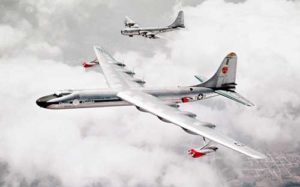 Sep 5: The U.S. Air Force announces that it has awarded a contract to General Electric and Convair in Fort Worth, Texas, to develop a nuclear-powered aircraft.
Sep 5: The U.S. Air Force announces that it has awarded a contract to General Electric and Convair in Fort Worth, Texas, to develop a nuclear-powered aircraft.
![]()
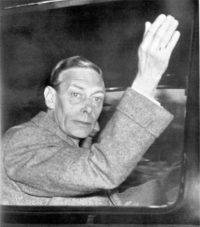 Sep 7: King George VI unexpectedly returns to London from Balmoral, where he has been struggling to recuperate from a long illness that had plagued him since May. He arrives by train at 10:00 a.m. and is seen going into the offices his radiologist. Later that afternoon, he boards a Viking aircraft to fly back to Scotland.
Sep 7: King George VI unexpectedly returns to London from Balmoral, where he has been struggling to recuperate from a long illness that had plagued him since May. He arrives by train at 10:00 a.m. and is seen going into the offices his radiologist. Later that afternoon, he boards a Viking aircraft to fly back to Scotland.
![]()
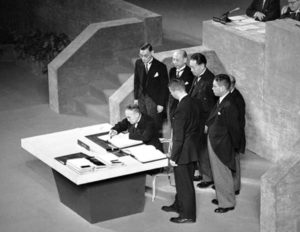 Sep 8: Representatives from forty-eight nations sign the Treaty of San Francisco with Japan to formally end the World War in the Pacific. The Soviets refuse to sign the treaty, and angrily denounce it as the first step toward war. On the same day, the U.S and Japan sign a security treaty allowing the U.S. to retain troops in Japan.
Sep 8: Representatives from forty-eight nations sign the Treaty of San Francisco with Japan to formally end the World War in the Pacific. The Soviets refuse to sign the treaty, and angrily denounce it as the first step toward war. On the same day, the U.S and Japan sign a security treaty allowing the U.S. to retain troops in Japan.
![]() Sep 8: Tony Bennett’s single “Because of You” begins its eight weeks at number one.
Sep 8: Tony Bennett’s single “Because of You” begins its eight weeks at number one.
![]() Sep 10: Britain announces a round of sanctions against Iran due to Iran’s nationalization of the British-owned Anglo-Iranian Oil company’s oil fields and massive refinery in Abadan. Iran will no longer be allowed to convert sterling into dollars or receive sterling for oil without special permission from the British Treasury. Britain also suspends export licenses for certain scarce goods that Iran needs or can resell for dollars to other markets.
Sep 10: Britain announces a round of sanctions against Iran due to Iran’s nationalization of the British-owned Anglo-Iranian Oil company’s oil fields and massive refinery in Abadan. Iran will no longer be allowed to convert sterling into dollars or receive sterling for oil without special permission from the British Treasury. Britain also suspends export licenses for certain scarce goods that Iran needs or can resell for dollars to other markets.
![]()
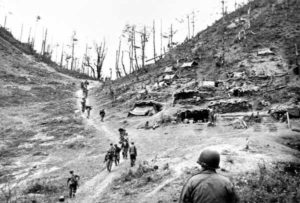 Sep 13: UN troops launch a battle to take control of an un-named ridge overlooking a valley in which U.N. troops have been slowly advancing. After a vicious 30-day battle in which 3,700 U.N. soldiers and 25,000 North Korean and Chinese soldiers are killed, the ridge earns its name in the Battle of Heartbreak Ridge.
Sep 13: UN troops launch a battle to take control of an un-named ridge overlooking a valley in which U.N. troops have been slowly advancing. After a vicious 30-day battle in which 3,700 U.N. soldiers and 25,000 North Korean and Chinese soldiers are killed, the ridge earns its name in the Battle of Heartbreak Ridge.
![]()
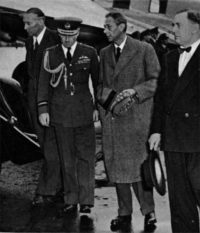 Sep 15: On advice from his doctors, King George VI flies to London from Balmoral in order to consult his doctors and undergo further tests to determine the cause of his recurring illnesses and persistent cough.
Sep 15: On advice from his doctors, King George VI flies to London from Balmoral in order to consult his doctors and undergo further tests to determine the cause of his recurring illnesses and persistent cough.
![]() Sep 18: Buckingham Palace issues a medical bulletin: “During the King’s recent illness a series of examinations have been carried out, including radiology and bronchoscopy. These investigations now show structural changes to have developed in the lung. His Majesty has been advised to stay in London for further treatment.” Neither this bulletin nor other bulletins to follow will specify the nature of those “structural changes.” The Queen has flown back to London from Balmoral with Princess Elizabeth and the Duke of Edinburgh.
Sep 18: Buckingham Palace issues a medical bulletin: “During the King’s recent illness a series of examinations have been carried out, including radiology and bronchoscopy. These investigations now show structural changes to have developed in the lung. His Majesty has been advised to stay in London for further treatment.” Neither this bulletin nor other bulletins to follow will specify the nature of those “structural changes.” The Queen has flown back to London from Balmoral with Princess Elizabeth and the Duke of Edinburgh.
![]() Sep 18: Elia Kazan’s film version of Tennessee Williams’s A Streetcar Named Desire is released. It stars Vivien Leigh, Marlon Brando, Kim Hunter and Karl Malden.
Sep 18: Elia Kazan’s film version of Tennessee Williams’s A Streetcar Named Desire is released. It stars Vivien Leigh, Marlon Brando, Kim Hunter and Karl Malden.
![]() Sep 19: Screenwriter Martin Berkeley, who says he was active in the Communist Party between 1937 and 1943, testifies before the House Un-American Activities Committee hearing in Los Angeles. Berkeley names more than a hundred people who he says have been party members. He also testifies that he and his family were threatened with bodily harm if he were to testify before the committee. Berkeley will be regarded as the HUAC’s most valuable witness due to the sheer numbers of people he is willing to name.
Sep 19: Screenwriter Martin Berkeley, who says he was active in the Communist Party between 1937 and 1943, testifies before the House Un-American Activities Committee hearing in Los Angeles. Berkeley names more than a hundred people who he says have been party members. He also testifies that he and his family were threatened with bodily harm if he were to testify before the committee. Berkeley will be regarded as the HUAC’s most valuable witness due to the sheer numbers of people he is willing to name.
![]()
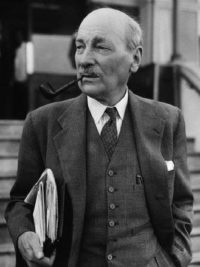 Sep 19: British Labour Prime Minister Clement Attlee announces that he is calling snap elections for October 25. Attlee’s government has struggled for the past eighteen months with a razor-thin majority of six out of 625 seats in Commons and deep internal divisions in the Labour party. The public is already weary from twelve years of economic austerity and continued fighting in Korea, both with no apparent letup in sight. Now the economy is struggling with a dollar shortage due to significant increases in defense spending and the cutoff of taxes and profits from Britain’s 53% stake in the Anglo-Iranian Oil Company. Attlee hopes to achieve a more workable majority in the House of Commons to deal with these issues. Conservatives hope, and Labourites fear that public weariness will bring Conservatives back into power under Winston Churchill.
Sep 19: British Labour Prime Minister Clement Attlee announces that he is calling snap elections for October 25. Attlee’s government has struggled for the past eighteen months with a razor-thin majority of six out of 625 seats in Commons and deep internal divisions in the Labour party. The public is already weary from twelve years of economic austerity and continued fighting in Korea, both with no apparent letup in sight. Now the economy is struggling with a dollar shortage due to significant increases in defense spending and the cutoff of taxes and profits from Britain’s 53% stake in the Anglo-Iranian Oil Company. Attlee hopes to achieve a more workable majority in the House of Commons to deal with these issues. Conservatives hope, and Labourites fear that public weariness will bring Conservatives back into power under Winston Churchill.
![]() Sep 20: The Communist High Command in North Korea announce that they are willing to resume truce talks which have been suspended since August 23. The talks were suspended after Communist forces accused the U.N. of bombing and strafing the neutral zone surrounding Kaesong, site of the suspended talks. Gen. Matthew Ridgway, U.N. Commander, rejected the charges as a made-up pretext for halting the talks.
Sep 20: The Communist High Command in North Korea announce that they are willing to resume truce talks which have been suspended since August 23. The talks were suspended after Communist forces accused the U.N. of bombing and strafing the neutral zone surrounding Kaesong, site of the suspended talks. Gen. Matthew Ridgway, U.N. Commander, rejected the charges as a made-up pretext for halting the talks.
![]() Sep 21: A bulletin issued from Buckingham Palace announces that “The condition of the King’s lung gives cause for concerns. In view of the structural changes referred to in the last bulletin we have advised his Majesty to undergo an operation in the near future. This advice the King has accepted.”
Sep 21: A bulletin issued from Buckingham Palace announces that “The condition of the King’s lung gives cause for concerns. In view of the structural changes referred to in the last bulletin we have advised his Majesty to undergo an operation in the near future. This advice the King has accepted.”
![]() Sep 21: Bruce K. Brown, the deputy administrator of the U.S. Petroleum Administration for Defense, warns that gasoline and oil rationing may become necessary in the U.S. next winter. He cites the loss of 610,000 barrels per day that has been incurred since exports from Iran’s massive Abadan oil refinery ended in June. About half of that loss has been made up with increased production elsewhere in the Middle East and Caribbean and by tapping emergency stockpiles. But Brown warns, “we cannot go on dipping into the stockpiles indefinitely.” He calls for further allocation of scarce steel production for the oil industry so it can continue drilling. “The alternative could all too easily be the collapse of the closely intertwined defense of the free world,” he warns. Oil experts expect demand for home heating oil to go up as large numbers of American homes and businesses switch from coal to oil. “When winter weather strikes and the United States demands for oil go up, the strain will be on. … Unless the situation is better, and soon, we are in for trouble.”
Sep 21: Bruce K. Brown, the deputy administrator of the U.S. Petroleum Administration for Defense, warns that gasoline and oil rationing may become necessary in the U.S. next winter. He cites the loss of 610,000 barrels per day that has been incurred since exports from Iran’s massive Abadan oil refinery ended in June. About half of that loss has been made up with increased production elsewhere in the Middle East and Caribbean and by tapping emergency stockpiles. But Brown warns, “we cannot go on dipping into the stockpiles indefinitely.” He calls for further allocation of scarce steel production for the oil industry so it can continue drilling. “The alternative could all too easily be the collapse of the closely intertwined defense of the free world,” he warns. Oil experts expect demand for home heating oil to go up as large numbers of American homes and businesses switch from coal to oil. “When winter weather strikes and the United States demands for oil go up, the strain will be on. … Unless the situation is better, and soon, we are in for trouble.”
![]() Sep 23: Gen. Ridgway tentatively accepts, with conditions, North Korea’s and China’s call for renewed truce talks in Kaesong. Ridgway rejects the establishment of a special group to investigate Communist claims that U.N. planes violated Kaesong’s neutral zone, saying “the cases are closed.”
Sep 23: Gen. Ridgway tentatively accepts, with conditions, North Korea’s and China’s call for renewed truce talks in Kaesong. Ridgway rejects the establishment of a special group to investigate Communist claims that U.N. planes violated Kaesong’s neutral zone, saying “the cases are closed.”
![]()
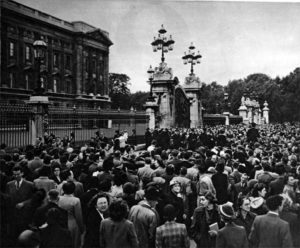 Sep 23: Crowds gather outside Buckingham Palace on a grey and wet morning — “the traditional London morning for all vital occasions,” says the Daily Mail. The stone-quiet crowd awaits news of King George VI’s condition as he undergoes surgery for an unspecified lung ailment. The surgery takes place in the Buhl room of Buckingham Palace, which has been turned into an operating theater. Late that afternoon, a bulletin, signed by five doctors, is posted at the palace gates. It says, “The King underwent an operation for lung resection this morning. Whilst anxiety must remain for some days, His Majesty’s immediate post-operative condition is satisfactory.” The King will recover somewhat over the next few weeks, but he will remain seriously ill. After he dies on February 6, 1952, it will be revealed that he was suffering from lung cancer and that his entire left lung had been removed during surgery.
Sep 23: Crowds gather outside Buckingham Palace on a grey and wet morning — “the traditional London morning for all vital occasions,” says the Daily Mail. The stone-quiet crowd awaits news of King George VI’s condition as he undergoes surgery for an unspecified lung ailment. The surgery takes place in the Buhl room of Buckingham Palace, which has been turned into an operating theater. Late that afternoon, a bulletin, signed by five doctors, is posted at the palace gates. It says, “The King underwent an operation for lung resection this morning. Whilst anxiety must remain for some days, His Majesty’s immediate post-operative condition is satisfactory.” The King will recover somewhat over the next few weeks, but he will remain seriously ill. After he dies on February 6, 1952, it will be revealed that he was suffering from lung cancer and that his entire left lung had been removed during surgery.
![]() Sep 24: The MGM musical film Show Boat is released. It stars Kathryn Grayson, Ava Gardner, and Howard Keel.
Sep 24: The MGM musical film Show Boat is released. It stars Kathryn Grayson, Ava Gardner, and Howard Keel.
![]() Sep 25: Communist negotiators angrily walk out of a preliminary meeting in Kaesong to discuss resumption of truce talks. U.N. negotiators insist on discussing conditions for the resumption of truce talks which include relocating the talks to a more fully neutral location. Kaesong lies south of the 38th parallel, but inside of Communist-held territory. The Communist negotiators are only authorized to discuss the date and time of the talks’ resumption.
Sep 25: Communist negotiators angrily walk out of a preliminary meeting in Kaesong to discuss resumption of truce talks. U.N. negotiators insist on discussing conditions for the resumption of truce talks which include relocating the talks to a more fully neutral location. Kaesong lies south of the 38th parallel, but inside of Communist-held territory. The Communist negotiators are only authorized to discuss the date and time of the talks’ resumption.
![]() Sep 25: Iran orders the last 317 British petroleum engineers, technicians and managers to leave the country by October 4. The government also says that the National Iranian Oil Company’s offer of individual contracts for British staff have been rescinded. British staff have stood firm in rejecting individual contracts. The Iranian Nationalization Board is convinced that the British presence is preventing Iran’s full takeover of the Anglo-Iranian Oil Company’s refinery in Abadan. Back in London, Clement Attlee convenes an emergency cabinet meeting. The question: do they acquiesce to the expulsion and surrender fifty years’ investment in the country, or do they intervene militarily to protect the employees and AIOC’s vast investments? Many Britons believe that Attlee’s government has bungled the whole humiliating crisis. With elections looming in October, the Cabinet sees no good option.
Sep 25: Iran orders the last 317 British petroleum engineers, technicians and managers to leave the country by October 4. The government also says that the National Iranian Oil Company’s offer of individual contracts for British staff have been rescinded. British staff have stood firm in rejecting individual contracts. The Iranian Nationalization Board is convinced that the British presence is preventing Iran’s full takeover of the Anglo-Iranian Oil Company’s refinery in Abadan. Back in London, Clement Attlee convenes an emergency cabinet meeting. The question: do they acquiesce to the expulsion and surrender fifty years’ investment in the country, or do they intervene militarily to protect the employees and AIOC’s vast investments? Many Britons believe that Attlee’s government has bungled the whole humiliating crisis. With elections looming in October, the Cabinet sees no good option.
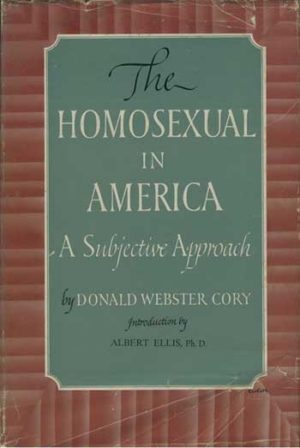 Sep 28: The landmark gay rights book The Homosexual In America is published. Written by Edward Sagarin under the pseudonym Donald Webster Cory, The Homosexual In America: A Subjective Study is the first major American publication to provide an exhaustive overview of a kind of gay life that is largely underground and out of sight of ordinary Americans. It covers a lot of ground: gay bars, drag queens, relationships, and marriages — as convenience and as cover — and includes a lexicon of gay slang. But most importantly, Sagarin argues that homosexuals are “an unrecognized minority” on par with other minorities struggling for recognition in America. “I am convinced,” he writes, “that there is a permanent place in the scheme of things for the homosexual — a place that transcends the reaction to hostility and that will continue to contribute to social betterment after social acceptance. … It will broaden the base for freedom of thought and communication, will be a banner-bearer in the struggle for liberalization of our sexual conventions, and will be a pillar of strength in the defense of our threatened democracy.” It’s almost impossible to overstate the impact this book will have. Future generations of American gay rights leaders will say that The Homosexual In America inspired them to become activists.
Sep 28: The landmark gay rights book The Homosexual In America is published. Written by Edward Sagarin under the pseudonym Donald Webster Cory, The Homosexual In America: A Subjective Study is the first major American publication to provide an exhaustive overview of a kind of gay life that is largely underground and out of sight of ordinary Americans. It covers a lot of ground: gay bars, drag queens, relationships, and marriages — as convenience and as cover — and includes a lexicon of gay slang. But most importantly, Sagarin argues that homosexuals are “an unrecognized minority” on par with other minorities struggling for recognition in America. “I am convinced,” he writes, “that there is a permanent place in the scheme of things for the homosexual — a place that transcends the reaction to hostility and that will continue to contribute to social betterment after social acceptance. … It will broaden the base for freedom of thought and communication, will be a banner-bearer in the struggle for liberalization of our sexual conventions, and will be a pillar of strength in the defense of our threatened democracy.” It’s almost impossible to overstate the impact this book will have. Future generations of American gay rights leaders will say that The Homosexual In America inspired them to become activists.![]() Sep 28: The British government announces that they will seek a solution to the Abadan Crisis at the United Nations. Sir Gladwyn Jebb, head of the British delegation to the U.N., says he will ask the Security Council to call on Iran to adhere to the interim ruling by the International Court of Justice, and to cancel its evection notice against 317 Anglo-American Oil Company employees still in Abadan. The Security Council will take up the appeal on Monday. Iranian Prime Minister Mohammed Mossadegh announces that he will fly to New York for the discussions. Meanwhile in Abadan, all but twelve AIOC employees have been formally stripped of their jobs by the National Iranian Oil Company and barred from their offices and company property.
Sep 28: The British government announces that they will seek a solution to the Abadan Crisis at the United Nations. Sir Gladwyn Jebb, head of the British delegation to the U.N., says he will ask the Security Council to call on Iran to adhere to the interim ruling by the International Court of Justice, and to cancel its evection notice against 317 Anglo-American Oil Company employees still in Abadan. The Security Council will take up the appeal on Monday. Iranian Prime Minister Mohammed Mossadegh announces that he will fly to New York for the discussions. Meanwhile in Abadan, all but twelve AIOC employees have been formally stripped of their jobs by the National Iranian Oil Company and barred from their offices and company property.
![]() Sep 28: The science fiction film The Day the Earth Stood Still is released.
Sep 28: The science fiction film The Day the Earth Stood Still is released.
![]() Sep 30: Joint Chiefs of Staff Chairman Gen. Omar Bradley says that the U.N. Command will probably refuse any proposal to resume truce talks in Communist-held Kaesong. He says that the talks should be held “in some place where each side has equal rights.”
Sep 30: Joint Chiefs of Staff Chairman Gen. Omar Bradley says that the U.N. Command will probably refuse any proposal to resume truce talks in Communist-held Kaesong. He says that the talks should be held “in some place where each side has equal rights.”
![[Emphasis Mine]](http://jimburroway.com/wp-content/uploads/2018/01/WacoRaid1953.jpg)
